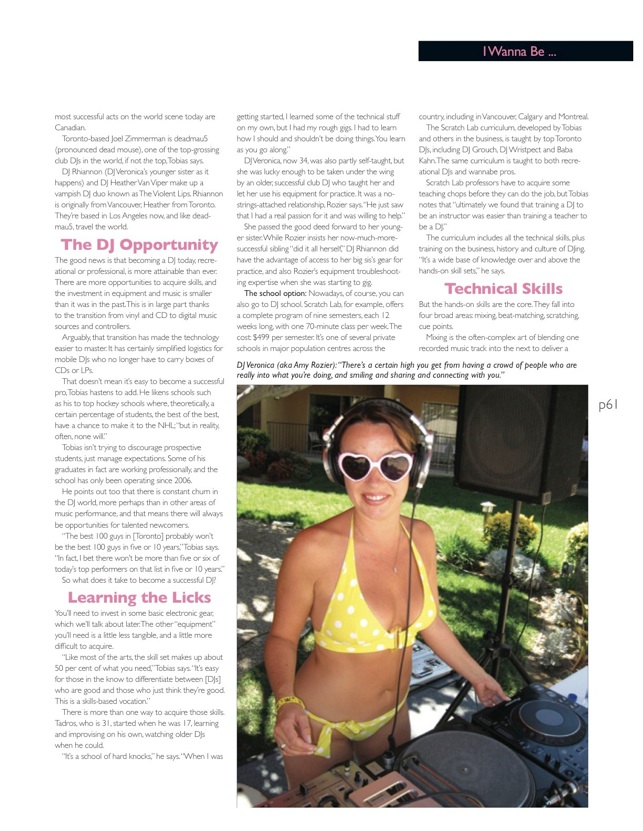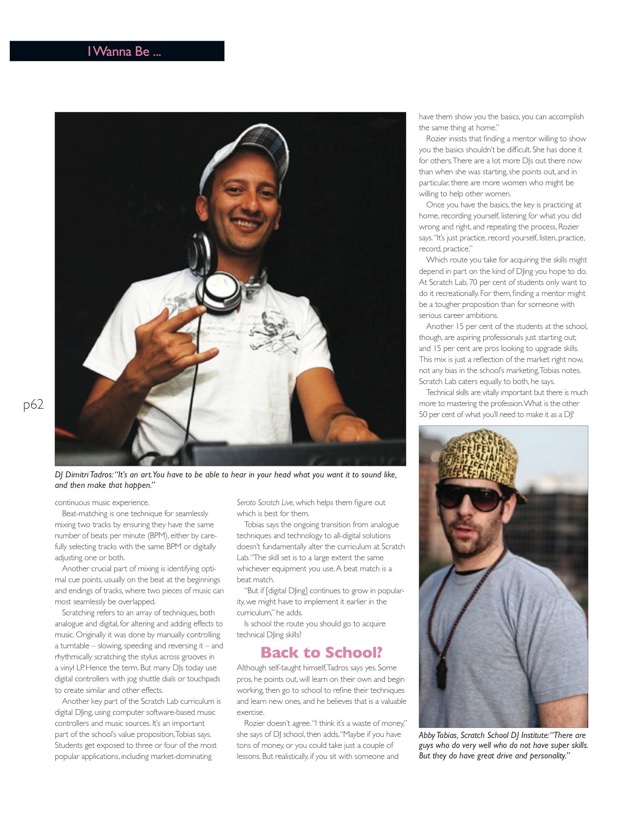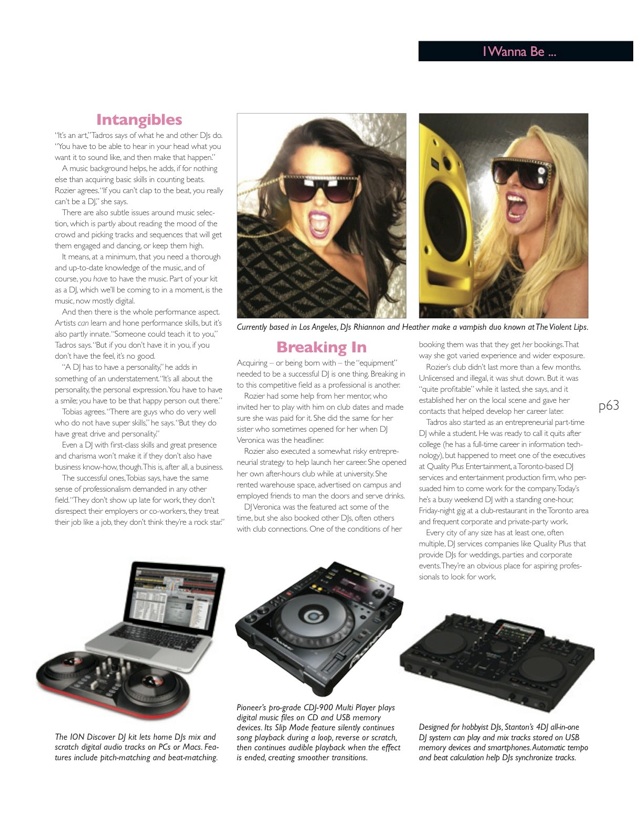In the media...

Dj Veronica voted Vancouver’s Best Local DJ 2001!

The vancouver Province, Feb 10, 2002
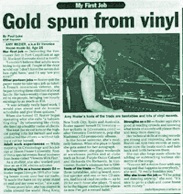
Maui Time, June 5, 2003

The globe & Mail, january 29, 2002

Her first job - Delivering the Vancouver Sun in Port Coquitlam at age 11. She kept the route about a month.
"I couldn't believe that adults were trying to rip me off. People at the door would say 'I dont have the seven dollars right here, and I'd say 'are you sure?'"
Other pre-teen jobs - Rozier quit the paper route to take up a job as tutor. A French immersion veteran, she began tutoring three children of a local family. Her twice-weekly class expanded to six people, bringing her hourly earnings to as much as $50.
"It was actually really hard work. I would plan ahead and do lessons schedules and give them quizzes." When she turned 12. Rozier began operating what she calls "a babysitting ring." By networking like crazy, she lined up a healthy roster of clients.
She kept the nicest kids or the highest paying jobs for herself and subcontracted the others - without taking a cut for herself.
Adult work experiences - While majoring in Criminology and Sociology at Simon Fraser University, Rozier ran a special events floral business from home called "Flowers With Flair." As a student, she also worked part time as an ICBC claims adjuster.
Working life as a house music DJ - Rozier began DJ-ing in 1999 after hearing house music over her car radio. "It made the hairs on my arms stand on end and my eyes water." she said. Three years later, she has played in clubs around the world: Hong Kong, New York City, Spain and Australia. Rozier named herself DJ Veronica -her website is djveronica.com -after Veronica Electronica, pop star Madonna's DJ-promo-only albums.
In the house universe, she's modestly famous. When she plays in Spain she gets asked for her autograph. In Vancouver, she plays weekends at warehouse parties and at clubs such as Sonar, Purple Onion Cabaret and Richards On Richards. In Vancouver, Rozier's minimum fee is $200.
Tools of the trade - Two, sometimes three turntables, mixing board, monitor speaker and one or two CD mixers. And lots of vinyl records -- - up to 20 for each hour she plays. "I used to be the biggest clothes junkie whereas now I've got a record habit."
Strengths as a DJ - Rozier says she's good at reading crowds and knowing what kinds of sounds will please them and keep them dancing.
Her technical skills at mixing records are strong and improving, she says. Rozier can spin two records at once, make sure the beats match and fade back and forth between them.
She can also forge sonic effects by adding or subtracting various elements of the songs.
"You can kill a dance floor with one song and that happens to everybody," she said. "It really humbles you."
Why she loves the job - "I'd be going out dancing anyway." she said. "It's nice to go to a club and come home with money."
Asserting their right to be heard, women disc jockeys are emerging as bona fide masters of the dance floor
House music, along with its early siblings techno and garage, has emboldened an entire new generation to take to the dance floor, while makmg superstars out of DJs. Yet while women have always comprised half of the party scene in Canada and abroad, their position behind the decks has only recently come to the forefront.
Vancouver's Amy Rozier, a.k.a. DJ Veronica, knows well the struggle to be heard. The British-born DJ has toured the United States, Europe, Hong Kong and Australia, and is ranked 142 out of over 12,000 DJs on the surfer-voted site thedjlist.com. But recognition, she finds, remains an uphill struggle.
"I went to this new record store and I was looking through the records," she recalls. "There was no one else in the store. I put one on a turntable, and said, 'Do you mind if I listen to these?' And the guy said to me, 'No problem, but if any DJs come in, I have to give them priority.'"
Across the country, female DJs have been forming collectives to assert their right to be heard. From Vancouver's Deep Six, (DJs AMtrak, Michelle, Little T and others) to Toronto's Chicks Dig It, founded by DJs Chocolate and Freedom, the sisters have been banding together.
Often, they've found, it can pay off. "I was a brand-new DJ," says Sarah Noah, nocturnally known as DJ Plush, as she recalls the creation of the Ottawa collective Chicks with Decks. "I wanted to do a club night, and one of the guys I was working with suggested I do a female thing because I would have something unique as opposed to the usual DJ night that goes on everywhere."
Over the three-year life of Chicks with Decks, the collective moved from Tuesday gigs at Ottawa nightspots the Well and Soho, to the choice Friday slot. And while Chicks with Decks folded late last year, some see that as a sign that girl groupings in any one particular locale are necessary for a limited time only. "It really served as a great steppingstone for all of us," says Noah. "Now we're known and getting bookings everywhere else."
Indeed, not every female DJ even agrees with the idea of collectivization. That's particularly true of techno maven Misstress Barbara (Barbara Bonfiglio), the Montreal DJ and producer who has catapulted to global fame.
"[Journalists] write 'queen of techno' or 'best female DJ in the world,' " she rues. "To me ... it' s a restricted compliment, like you're the most intelligent of the idiots."
Bonfiglio has released multiple records, signed to American label, Moonshine, and even started her own successful label, Relentless Music. And she did it all without the help of a single girl group. "I'm the living proof," she asserts, "that you can make it with talent."
Still, there's no question that some women have enjoyed getting support from their female peers. It's a support that has often been helped along by the Internet, from the Web 'zine pinknoises.com to the Australian site femmebots.com.
Looking back on her own start in the business, Marisha Shegda, a 22-year-old Calgary DJ known as Lotus Queen, says that "it would have been nice to have a few more girls to bond with in town." Shegda, who runs the popular drum 'n' bass show Remote Emissions on the University of Calgary student radio station, CJSW, says that "that's where the Internet came in: I found this mailing list called sisterdjs, and it had girls on it from all over Canada and the U.S."
There are many reasons for women's minority status, nor the least of which is a concomitant lack of women in technological fields from computer programming to engineering. The mixing of dance tracks on two, and sometimes three, turntables, and dealing with sophisticated dance-club equipment, is an extremely complicated procedure.
As for what women do with all that equipment, many observers also believe that gender plays a role, with women tending more to feel - and go with - the flow, as opposed to men's focus on beat mechanics.
"There just always seems to be a warmer vibe when there's a chick spinning," argues Ottawa's Noah. "Maybe there's a little bit more of a spiritual thing that goes on when a chick's on decks. . . . It seems to have more vibe in it, more groove."
Jane Walker, who co-directed last year's Canadian documentary Spinsters, has a more sociopolitical explanation for the differences. "Maybe because we're brought up aiming to please, women look at the crowd more. I don't know if women feel music more than men, or men are more technically minded than women, but I think that women are perhaps a little bit more willing to let their feelings guide what they do."
What promoters choose to emphasize is one example of how far women still have to go in the industry. Although DJ Rap, for one, a veteran of England's drum 'n' bass scene, obtained considerable mainstream fame when her 1999 album Learning Curve was released, a lot of hype was also whipped up concerning her considerable cleavage.
It's an aspect of the scene that draws the wrath of Bonflglio. Her disc Relentless Beats, Vol. 2, to be released on Feb. 12, boasts a cover photo of her fully clothed and from behind, in an attempt to draw attention away from her appearance. "Since the beginning, I knew exactly where I was going and I knew exactly what I hated," she says. "I never let anyone use my looks. I know I could sell more, but I don't care."
What she does care about, it seems, is playing music. And like many women in Canada's dance scene, she feels she'll only be truly accepted when the gender epithet is finally dropped.
Calgary's Shegda perhaps puts it best. "Why," she asks, "can't we simply be DJs?"
Special to The Globe and Mail
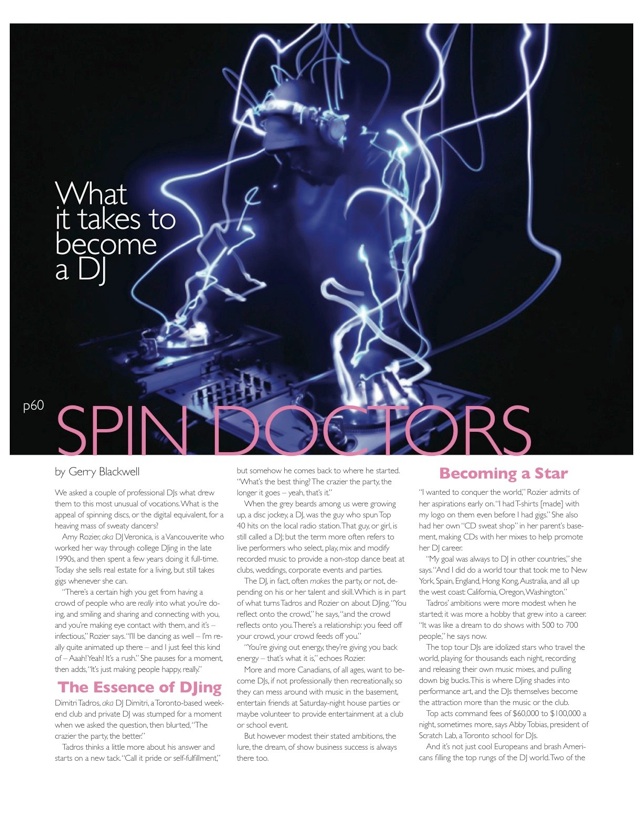
Here’s How Magazine Sept 2011 p. 60-64 by gerry blackwell
